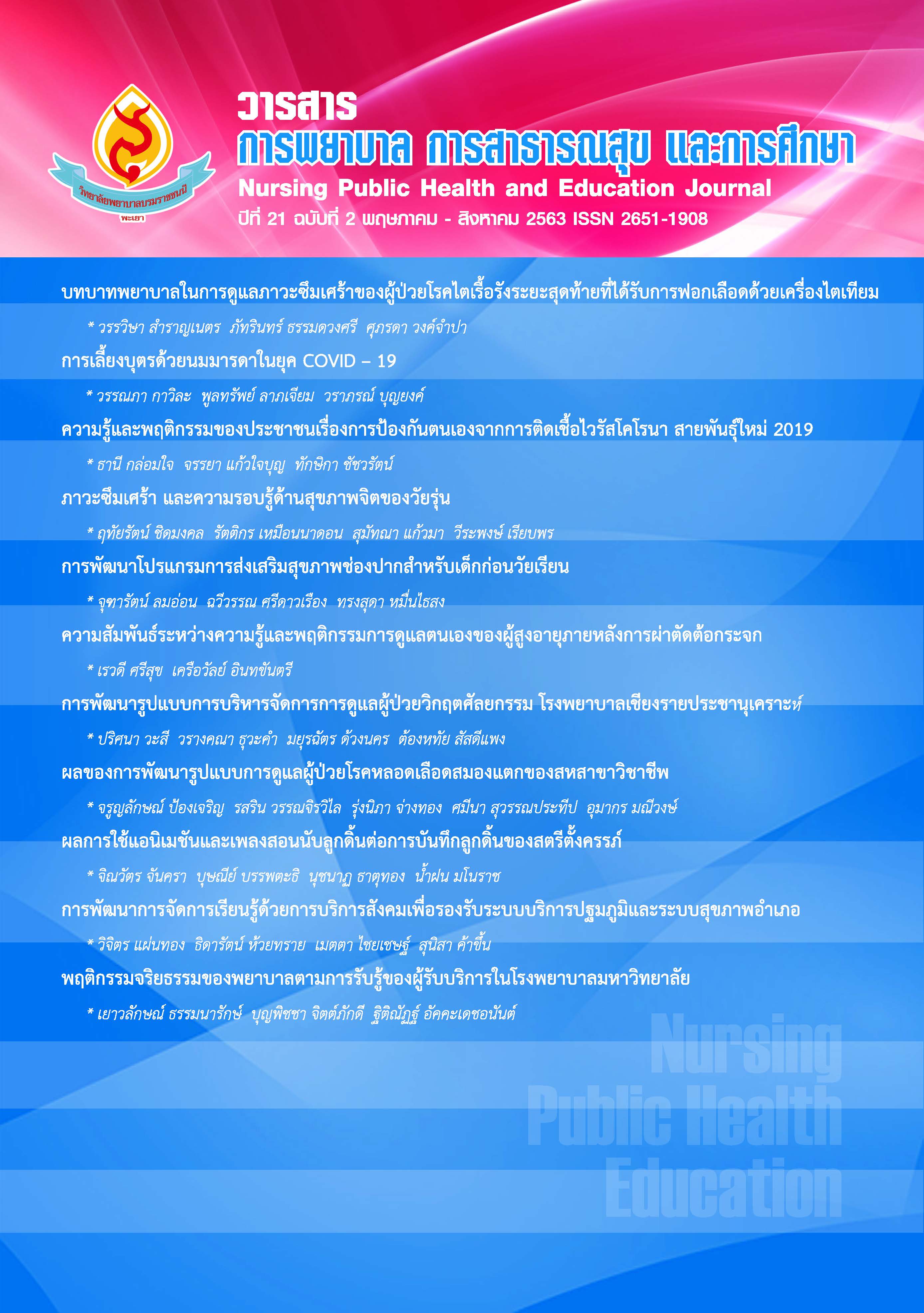ความรู้และพฤติกรรมของประชาชนเรื่องการป้องกันตนเอง จากการติดเชื้อไวรัสโคโรนา สายพันธุ์ใหม่ 2019
คำสำคัญ:
การติดเชื้อไวรัสโคโรนา 2019, ความรู้, พฤติกรรมการป้องกันตนเองบทคัดย่อ
การวิจัยครั้งนี้มีวัตถุประสงค์เพื่อศึกษาความรู้และพฤติกรรมของประชาชนในเรื่องการป้องกันตนเองจากการติดเชื้อไวรัสโคโรนาสายพันธุ์ใหม่ 2019 (COVID 19) และศึกษาความสัมพันธ์ระหว่างความรู้และพฤติกรรมของประชาชนในเรื่องการป้องกันตนเองจากการติดเชื้อไวรัสโคโรนาสายพันธุ์ใหม่ 2019 จากประชาชนในเขต ตำบลบ้านสาง อำเภอเมือง จังหวัดพะเยา กลุ่มตัวอย่างจำนวน 150 คน ได้มาจากการสุ่มอย่างง่าย มีอายุระหว่าง 20-60 ปี เก็บรวบรวมข้อมูลในเดือนเมษายน เครื่องมือที่ใช้ในการวิจัยเป็นแบบสอบถามที่ผู้วิจัยได้สร้างขึ้น ผ่านการตรวจสอบคุณภาพเครื่องมือโดยผู้เชี่ยวชาญ จำนวน 3 ท่าน ตรวจสอบความเตรงของเนื้อหา ได้ค่า IOC เท่ากับ 0.67-1 และนำไปทดลองใช้ วิเคราะห์ค่าความเที่ยง ∝-Coefficient ของ Cronbach เท่ากับ 0.89 และ 0.91 ตามลำดับ วิเคราะห์ข้อมูลโดยแจกแจงความถี่ ร้อยละ ค่าเฉลี่ยและส่วนเบี่ยงเบนมาตรฐาน และ สหสัมพันธ์เพียร์สัน (Pearson Product Moment Correlation) ผลการศึกษา พบว่า กลุ่มตัวอย่างส่วนใหญ่มีความรู้เรื่องการป้องกันตนเองจากการติดเชื้อไวรัสโคโรนา 2019 และพบว่าประเด็นที่กลุ่มตัวอย่างตอบไม่ถูกต้อง มากที่สุด ได้แก่ โรคที่เกิดจากเชื้อไวรัสโคโรนา 2019 (COVID 19) เป็นการติดเชื้อไวรัสตระกูลเดียวกับ ซาร์ส (SARs) และเมอร์ส (MERS) จึงทำให้มีความรุนแรงมาก ( ร้อยละ 20) เชื้อไวรัสโคโรนา 2019 (COVID 19) มีระยะฟักตัว 3 - 14 วัน (ร้อยละ 13.33) โรคที่เกิดจากเชื้อไวรัสโคโรนา 2019 (COVID 19) สามารถแพร่เชื้อจากคนสู่คนได้ และสามารถแพร่เชื้อได้ทันทีแม้ไม่มีอาการ (ร้อยละ 13.33)ด้านพฤติกรรมการป้องกันโรคที่เกิดจากเชื้อไวรัสโคโรนา 2019 พบว่า ภาพรวมอยู่ในระดับมาก ( =1.61, SD = 0.28) เมื่อพิจารณาในรายข้อ พบว่า ข้อที่มีคะแนนน้อย คือ ล้างมือด้วยเจลแอลกอฮอล์ความเข้มข้นอย่างน้อย 70% เมื่อต้องออกไปที่สาธารณะ (
= 1.03, SD = 0.67) ล้างมือทำความสะอาดด้วยสบู่ทุกครั้งหลังสัมผัสเงินเหรียญหรือธนบัตร (
= 1.23, SD = 0.68) ผลการวิเคราะห์ความสัมพันธ์ระหว่าง ความรู้กับพฤติกรรมการป้องกันตนเองจากการติดเชื้อไวรัสโคโรนาสายพันธุ์ใหม่ 2019 พบว่ามีความสัมพันธ์ทางบวกอยู่ในระดับปานกลาง (r = .327) อย่างมีนัยสำคัญทางสถิติ (p-value = .000) จากการศึกษา พบว่า ประชาชนส่วนใหญ่มีความรู้ และมีพฤติกรรมการป้องกันโรค ในระดับมาก แต่ยังพบรายข้อที่มีค่าคะแนนน้อย ซึ่งอาจส่งผลให้มีการแพร่กระจายของโรคได้ จึงควรมีการสร้างความตระหนักแก่ประชาชนในการปฏิบัติตัวเพื่อป้องกันการแพร่กระจายของโรค
เอกสารอ้างอิง
กชกร สมมัง. (2557). ปัจจัยที่มีความสัมพันธ์ต่อพฤติกรรมการป้องกันโรคไข้หวัดใหญ่ของผู้รับบริการงานผู้ป่วยนอก โรงพยาบาลพระนารายณ์มหาราช. วารสารสุขศึกษา, 37(126), 8-21.
ศูนย์ปฏิบัติการภาวะฉุกเฉิน กรมควบคุมโรค. (2563). ข้อมูลสำหรับการป้องกันตนเองจากโรค COVID-19 . เอกสารเผยแพร่สำหรับประชาชน . กระทรวงสาธารณสุข. สืบค้นเมื่อ 9 กุมภาพันธ์ 2563. จาก cdc.moph.go.th/viralpneumonia/file/int-pretection 03.pdf. วันที่ 28 มกราคม 2563.
ศูนย์ปฏิบัติการภาวะฉุกเฉิน กรมควบคุมโรค. (2563). “โรคติดเชื้อไวรัสโคโรนา 2019 coronavirus Disease 2019(COVID-19)”. เอกสารประกอบการประชุมทางไกล Vedeo conference ความรู้เรื่องโรคติดเชื้อโคโรนา 2019. กระทรวงสาธารณสุข.
กู้เกียรติ ก้อนแก้ว, ฐิติวรดา สังเกตุ, และศยามล ภูพิศ (2562). ปัจจัยที่มีความสัมพันธ์กับพฤติกรรมการป้องกันโรคไวรัสซิกาในหญิงตั้งครรภ์ อำเภอไทรงาม จังหวัดกำแพงเพชร. วารสารวิชาการสาธารณสุข, 28 (2),255-262.
จารุวรรณ แหลมไธสง. (2559).ปัจจัยที่มีอิทธิพลต่อพฤติกรรมป้องกันโรคติดเชื้อในระบบทางเดินหายใจของผู้ดูแลเด็กปฐมวัยในศูนย์เด็กเล็ก กรุงเทพมหานคร.วิทยานิพนธ์ปริญญาพยาบาลศาสตรมหาบัณฑิต สาขาวิชาการพยาบาลเวชปฏิบัติชุมชน คณะพยาบาลศาสตร์ มหาวิทยาลัยบูรพา.
ฉันทพิชญา โพธิสาจันทร์, นาตยา เกรียงชัยพฤกษ์, และบุญตา เจนสุขอุดม. (2551). พฤติกรรมการป้องกันโรคไข้หวัดนกของเครือข่ายแกนนำสุขภาพ. ประมวลผลงานวิชาการสุขศึกษาและพฤติกรรมสุขภาพ. กองสุขศึกษา กรมสนับสนุนบริการสุขภาพ, 76-91.
ประทานพร อารีราชการัณย์, กรพินท์ มหาทุมะรัตน์, ณัชชา มหาทุมะรัตน์, กีรติกา วงษ์ทิม และ ชนิศา หวงวงษ์ . (2561). การสำรวจความรู้ทัศนคติและการปฏิบัติเกี่ยวกับสุขอนามัยมือของทันตแพทย์ไทย. J DENT ASSOC THAI, 68(3), 218-229
วรรษมน จันทรเบ็ญจกุล. (2563). การป้องกันการติดเชื้อไวรัสโคโรนา 2019 (COVID-19). เอกสารประกอบการบรรยายเวทีจุฬาเสวนาครั้งที่ 23 เรื่อง ตระหนักดีกว่าตระหนก เรียนรู้และป้องกันโคโรนาไวรัส 2019. ภาควิชากุมารเวชศาสตร์ คณะแพทยศาสตร์ จุฬาลงกรณ์มหาวิทยาลัย.
ศูนย์ปฏิบัติการด้านข่าวโรคติดเชื้อไวรัสโคโรนา 2019.(2563). รายงานข่าวกรณีติดเชื้อไวรัสโคโรนา 2019 วันที่ 15 มีนาคม 2563. กระทรวงสาธารณสุข. สืบค้นเมื่อ 15 มีนาคม 2563 จาก https//www.moph.go.th.
ศูนย์ปฏิบัติการด้านข่าวโรคติดเชื้อไวรัสโคโรนา 2019.(2563.) รายงานข่าวกรณีติดเชื้อไวรัสโคโรนา 2019 วันที่ 1 เมษายน 2563. กระทรวงสาธารณสุข. สืบค้นเมื่อ 1 เมษายน 2563 จากWWW.Prachachat.Net.online.
สัญญา สุปัญญาบุตร. (2554). ปัจจัยที่มีผลต่อการปฏิบัติ ตนเพื่อป้องกันโรคไข้หวัดใหญ่ชนิด A (2009 H1N1) ของประชาชน อำเภอนามน จังหวัดกาฬสินธุ์. วารสารสำนักงานป้องกันควบคุมโรคที่ 6 ขอนแก่น, 18 (2),1-10.
สำนักงานสาธารณสุขจังหวัดพะเยา. (2563). รายงานการติดเชื้อโคโรน่า 2019. HDC –Dashboard .สืบค้นเมื่อวันที่ 1 พฤษภาคม 2563, จาก https://pyo.hdc.moph.go.th/hdc/main/index.php.
Zhu, N., Zhang, D., Wang, W., Li, X., Yang, B., Song, J.,...Tan, W. (2020). “A Novel Coronavirus from Patients with Pneumonia in China, 2019.” The New England Jouenal of Medicine. Retrieved January 24,2020. From https://www.nejm.org/doi/full/10.1056/NEJMoa2001017
World Health Organization. (2020). Pneumonia of unknown cause – China’, Emergencies preparedness, response, Disease outbreak news, Retrieved February 20, 2020, from https://www.who.int/csr/don/05-january-2020-pneumonia-of-unkown-cause-china/en/
ดาวน์โหลด
เผยแพร่แล้ว
รูปแบบการอ้างอิง
ฉบับ
ประเภทบทความ
สัญญาอนุญาต
ลิขสิทธิ์ (c) 2020 วารสารการพยายาล การสาธารณสุข และการศึกษา

อนุญาตภายใต้เงื่อนไข Creative Commons Attribution-NonCommercial-NoDerivatives 4.0 International License.



